Timothy Douglas Talks Zora Neale Hurston, Harlem Slang, and the Blues in Spunk
Douglas and a top-notch cast bring George C. Wolfe’s adaptation of three Hurston stories to Signature Theatre in Arlington, Virginia.
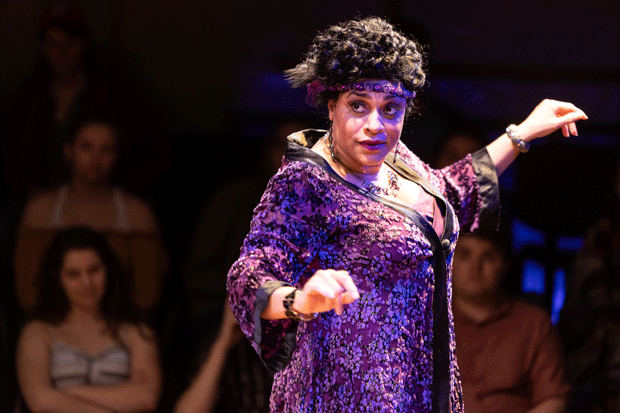
(© Christopher Mueller)
Zora Neale Hurston is probably best known for her 1937 novel Their Eyes Were Watching God, but readers didn't begin to take notice of her work until Alice Walker wrote an article in Ms. magazine in 1975 that pulled back the curtain on Hurston as a major American writer.
About a decade later, George C. Wolfe decided to dramatize three of Hurston's stories — "Sweat," "Story in Harlem Slang," and "The Gilded Six-Bits" — and fit them out with a blues-playing guitar man to help narrate and give texture to the tales. The result was Spunk, a hilarious and moving celebration of the people of Hurston's native Eatonville, Florida, and of their stories of love, betrayal, redemption, and endurance.
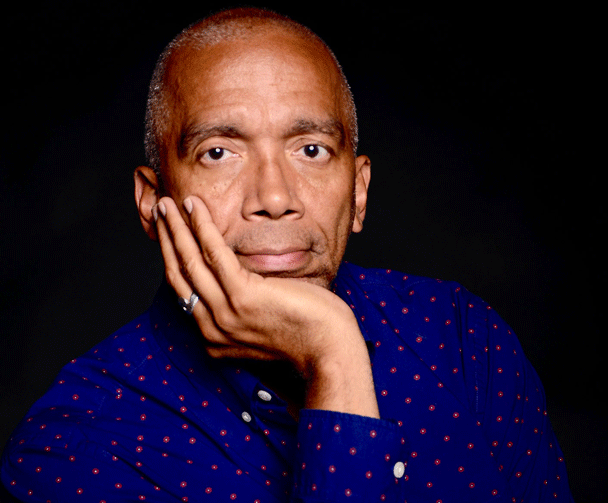
(© D'Ambrose Boyd)
Director Timothy Douglas recently sat down with TheaterMania to talk about some of the challenges he and the cast faced in reviving the play for today's audiences, and how they re-created Hurston's world by staying true to her language and bringing her characters to life with humor, integrity, and, yes, a whole lot of spunk.
The following interview has been condensed and edited for clarity.
What's the background of this play, and how did you get involved with it?
The play is 30 years old. George Wolfe premiered it at the Mark Taper Forum [in Los Angeles] then at the Public [in New York], and it was a big success. Eric [Schaeffer, Signature's artistic director] called me and said, "I have this idea." And I was like, "I remember the play, but I don't know about directing it." So I went back and read it, and I'm like, "OK, yeah, I actually love the challenge of this." And I knew that he would let me do whatever I wanted, and that was important — not because I think I'm going to do anything outrageous, but I just don't know what this is going to be.
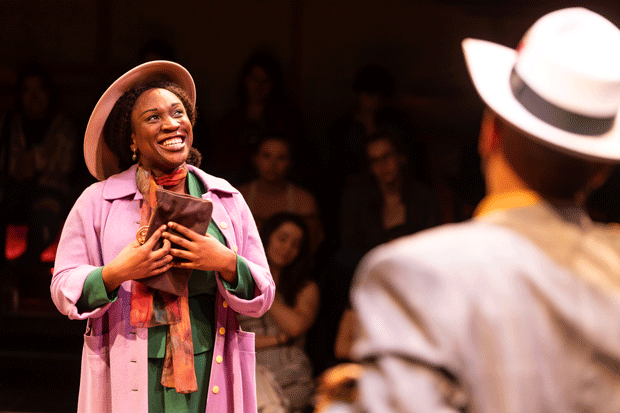
(© Christopher Mueller)
What did you think you'd want to do differently?
Thirty years ago, by George Wolfe's instructions, the entire third piece was meant to be performed as vaudeville. I didn't change any dialogue, but there were other things that he wove in that I chose to reinterpret. I knew I couldn't do certain things, and I was very clear with the cast about that, and so we just created our own bridge to the next thing that we could do. The energy was led by the women [Iyona Blake and Ines Nassara], and then we could actually put the women through what they had to go through during the stories because of how they triumph.
What do you mean by vaudeville in this context?
If I honored that, in the satirical sense, there's no way that people weren't going to think that it's minstrel. I didn't know how a white audience was going to receive that.
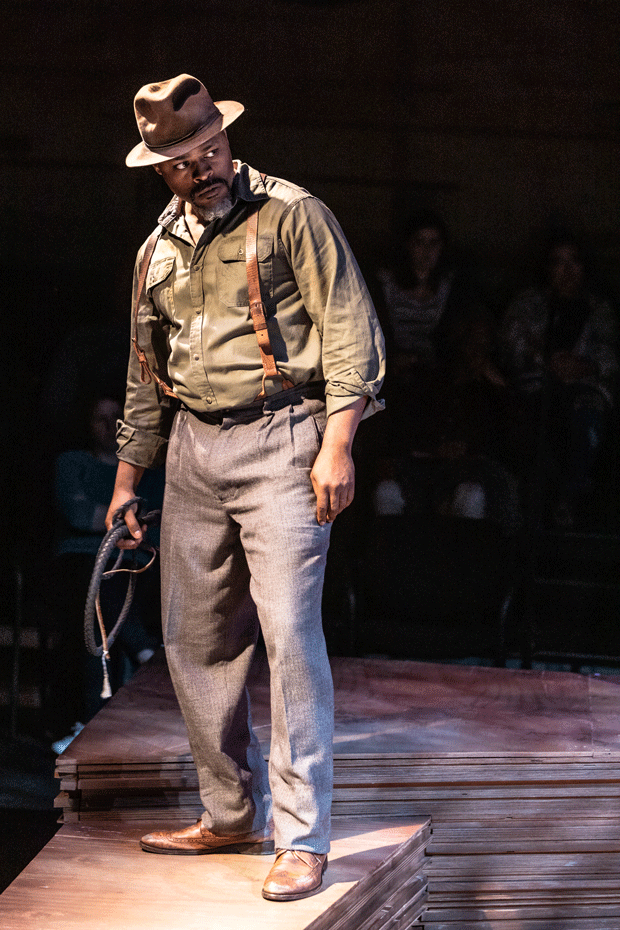
(© Christopher Mueller)
At the performance I attended, sometimes black audience members seemed to appreciate the humor more than white audience members, who looked a little conflicted, like they were looking around for permission to laugh.
What their dilemma was, is that in so much mainstream American theater, when there are black people onstage, the director has usually been a white man. And so you're not actually seeing authentic black life; you're seeing it filtered through the white lens. So white people have learned how to watch black people onstage. In my show, it's real black. [laughs] And they're like, "Is this right?" They don't know what to think. And that's thrilling!
Spunk is a play with music featuring a guitar man, played by Jonathan Mosley-Perry. Why do you think George C. Wolfe wanted to infuse these stories with the blues?
What he's doing is acknowledging the presence of the blues through Zora Neale Hurston's life in Eatonville, Florida. She's writing about her home. And even among black culture, it's a very unique world that she paints. I don't know these black people, so we really had to remain compelled by them. But it feels authentic. That's one of the elements that theatricalizes the short story — to sort of move it with music, sort of lubricate it.
The second piece, "Story in Harlem Slang," is hilarious. Were you and the cast concerned that audiences would see the two male characters (Hurston calls them "pimps") as stereotypes?
Yes…but again, that's why it's essential that you put ethnic-specific artists together to tell ethnic-specific stories. Not that I don't think white people shouldn't direct black plays; every artist should do what they feel moved to do. But be sensitive to the times that we live in. So we [Marty Austin Lamar, KenYatta Rogers, and Drew Drake complete the cast] didn't talk about it because we share all that. We had to go about the work of honoring Zora Neale Hurston and ourselves to make sure we felt we were working with integrity. When those brothers hooked into each other and allowed the prickliness of it all — the danger of these two black men getting up onstage and potentially falling into the trap of someone's stereotype — that was not an option. They kept committing to each other, and so they are the performance. They are generating enough energy through which Zora's language sings. And for those who don't literally know what the language is saying, for them it won't be allowed to devolve into whatever stereotype, because you cannot resist the performances that are happening up there. You will recognize the integrity of it.
Speaking of words and expressions that folks might not know, is it important to be familiar with the slang to understand that piece?
The actors know. And you're receiving the language of the characters. That's all you need, and the words are on top of that. If you happen to know, fine. But that's what [the actors'] journey was: getting large within themselves, to be able to quote that language — and then they really got into it! Oh, it cracks me up! [laughs]
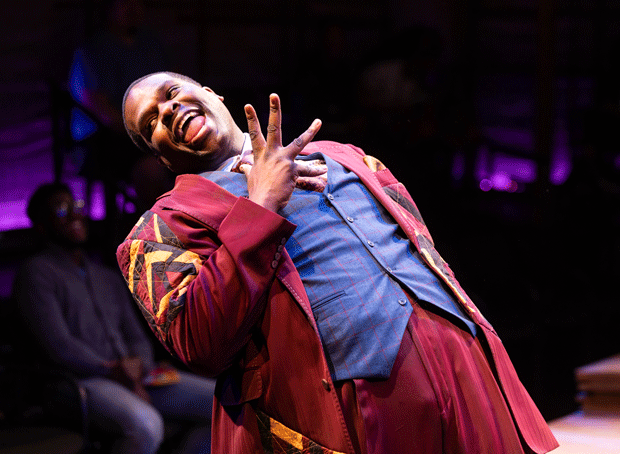
(© Christopher Mueller)







